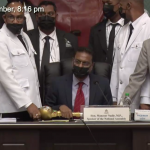
Businesses offering hire purchase services will now have to approach the Magistrate’s Court in order to repossess an item for which 70% of the hire purchase price has been paid. The new rule follows the passage of the Hire Purchase Bill by the National Assembly.
The Bill, which was tabled by Minister of Tourism, Industry and Commerce, Oneidge Walrond, received the support of the House, however, the main opposition – APNU+AFC, submitted that critical recommendations which could have resulted in consumers paying lower interest rates were omitted.
In defending the Bill on Wednesday, Minister Walrond said it creates a leveled playing field to guard against exploitative practices and sellers from unscrupulous customers.
It was explained that under the new legislation, which also covers credit sale and conditional sale agreements, businesses would not be allowed to arbitrarily repossess goods when a substantial amount of money has been paid or forcibly enter the premises of the consumer and the seize the items.
Singling out Section Three of the Bill, Minister Walrond said under the legislation, businesses will now be required to secure an order from the Magistrate’s Court against defaulting customers.
“This clause, Mr Speaker, 3.4 is one of the most consequential provisions in the bill as it relates to consumer protection. It states that among the provisions that every contract must include are one, the right of the buyer to terminate the agreement early, a prohibition on the seller repossessing the goods in the absence of a court order where 70% or more of the hire purchase price is being paid. Three, an obligation of the seller to provide notice to the buyer of an intention to repossess goods where less than 70% of the purchase price has been paid and the right of a buyer to make good on a breach having had notice of intention to repossess,” she explained.
Minister Walrond said the Bill is not lopsided though, noting that the protection afforded to the buyers is balanced by reasonable protection for the sellers.
“Take for example, the case where the seller is obliged to give 21 day-notice of intent to repossess. We can very well imagine an unscrupulous buyer on receipt of such notice may attempt to conceal or move the goods to avoid repossession. As we shall see however, the act imposes obligation on the buyer to promptly inform the seller on movement of the goods and imposes a significant monetary penalty for non-compliance. Additionally, there is provision whereby if the buyer decides to terminate an agreement early, he or she is obliged to make good on any arrears due,” the Minister explained.
Notably, under the new legislation, the Competition and Consumer Affairs Commission has been relieved of the responsibility of addressing some consumers complaints. The Magistrate’s Court now has the responsibility of facilitating dispute resolution.
APNU+AFC Member of Parliament, Haimraj Rajkumar told the House that the Coalition does not have an issue with what is contained in the Bill but rather with what has been omitted.
He said when the Bill was sent to the Special Select Committee of the Parliament, the Opposition recommended that interest rates be regulated but this recommendation was excluded when the Bill was returned to the House.
“Mr Speaker, we have heard the cries of the Guyanese consumers that the total cost of purchasing under the hire purchase arrangement is very high. You have to pay the down payment, the compound interest charged on the amount owed, the high interest rates charged on the outstanding balance, making this type of transaction extremely expensive on the long run,” he reasoned.
MP Rajkumar said often times, consumers are made to pay double or triple times the actual cost of the item under Hire Purchase Agreements. He said a clause should have been included to limit the amount of interest charged on an item.
His colleague, APNU+AFC MP Amanza Walton– Desir echoed similar sentiments as she lashed out at the Government MPs, who, in heckling MP Rajkumar, urged that he ‘blindly’ supports the legislation. MP Walton-Desir said it is unfortunate that the Government has taken a position to oppose the recommendations of the main opposition. She said the minutes of the Select Committee would show that there was an agreement to have the interest rates under hire purchase agreements regulated.
“It said that it must be regulated, and if we agree that it is a matter that must be regulated, that is our role as regulators, it is our role as regulators. But you know Mr Speaker, this is the difficulty that I am having with my colleagues on the other side – the lack of legislative courage that they display. Mr Speaker, they stand there and they heckle about why didn’t you do it from 2015 to 2020 and they operate as if the history of Guyana started in 2015. They had 23 years to this, did absolutely nothing, then come to say people of Guyana you must be grateful that we have finally put this on the agenda,” MP Walton-Desir told the House.
But Minister Walrond, in her rebuttal, said the Bill returned to the House after widespread consultation, and the coalition did not object at the level of the Select Committee.










You must be logged in to post a comment Login